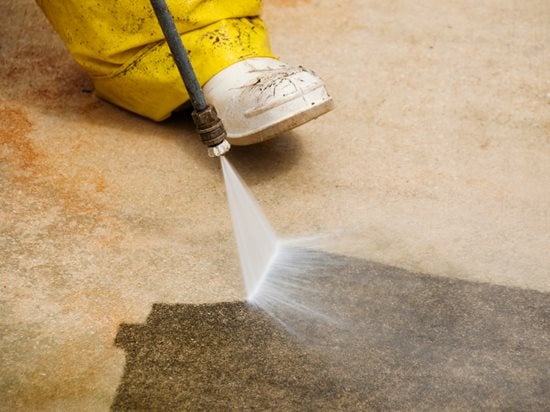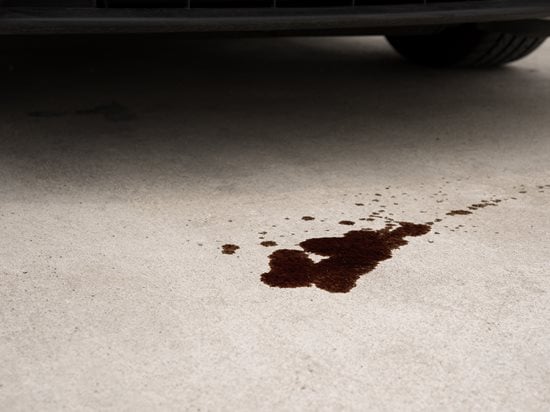- Concrete Driveways Info
- Concrete Driveway Pictures
- Exposed Aggregate
- Stamped Concrete Driveways
- Stained Concrete Driveways
- Modern Concrete Driveways
- Driveway Width
- Concrete Driveway Projects: Submitted by driveway contractors across the U.S.
- Concrete Driveway Cost
- Installing and Maintaining Concrete Driveways
- Concrete Driveway Construction Basics
- How to Clean a Concrete Driveway
- Concrete Driveway Maintenance
- Concrete Driveway Resurfacing
- Concrete Driveway Repair
- Driveway Sealer for Concrete
- Related Information
- Design Ideas: Concrete Driveway Info
- Concrete Contractors: Find Concrete Products and Suppliers
Cleaning a Concrete Driveway
How to clean your driveway and remove mold, oil, tire marks and moreA new decorative concrete driveway is a bit like a new car. It looks great for the first year or two, but will eventually lose its luster if you don’t clean and maintain it on a regular basis.
Stains from hot tire marks, oil leaks, mold and mildew, and chemicals (such as lawn fertilizer and deicing salts) are bound to happen. But they don’t have to ruin your curb appeal if you know the best methods and cleaning materials to use to remove them. Here are some tips for cleaning your concrete driveway and how to protect and preserve it for years to come.
Find contractors: Concrete cleaning near me
Shop: Concrete cleaners & degreasers
How to clean a concrete driveway with a hose or pressure washer
Here's what you'll need for cleaning everyday dirt and grime from a concrete driveway:
- A garden hose with a spray nozzle
- A concrete driveway cleaner
- A stiff broom to scrub the driveway
To remove stubborn dirt and stains, a pressure washer is often more effective, but you need to know what you’re doing. A power washer blasts water at anywhere from 1500 to 3300 psi, more than 50 times the force of a typical garden hose with a sprayer. If you use a setting that is too high or range that is too close, you could actually etch the concrete. See these tips for power washing concrete.
Tip: If you only plan to use a pressure washer once or twice a year, renting one may be cheaper than buying one. And you won’t need to worry about storing or maintaining it. If you've never used a pressure washer, you may want to hire a professional who knows exactly how to clean concrete driveway surfaces without doing damage.
What is the best cleaner for a concrete driveway?
When cleaning your driveway, it is best to use a specialized product. For general cleaning, you can find concrete driveway cleaner at your local home improvement store or online.
If you're trying to remove a specific type of stain, you'll need one of the following:
- For oil, grease, grime and dirt use a concrete degreaser (try RMC GhostShield Micro-Degreaser 1100).
- For efflorescence, salt deposits, lime or rust stains, use a cleaner made with non-corrosive or biodegradable acid (try RadonSeal Efflorescence Cleaner).
- For paint, sealers, epoxy or other topical contaminants, use a coatings remover or stripper (try Soy Gel 600GL from Franmar).
You may have something on-hand already that can be used to clean your driveway. Be careful though, if your driveway has a decorative finish or color, these may not be the right option. Do your research and test a small, out-of-the-way spot before cleaning the entire driveway.
Here are a few common household cleaners that can be used on a concrete driveway:
- Bleach and water solution
- Diluted vinegar
- Liquid dish detergent
- Baking soda
- Cat litter
How to clean oil and grease stains from a concrete driveway
Small oil spills or spots can sometimes be removed with nothing more than a strong detergent and a scrub brush. But a more effective method is to use a concrete cleaner or degreaser, a concentrated alkaline soap that will loosen up the oil to permit easier removal. For fresh spills, cover the stain with cat litter, sawdust, baking soda, or another absorbent material before cleaning. See How to Remove Oil Stains from Concrete.
How to clean mold and mildew from a concrete driveway
If your driveway is in a heavily shaded spot, you may have issues with mold and mildew growth, especially if weather conditions are damp and humid. Scrub the area with a mold-killing detergent or a solution of bleach and water (about 1 cup bleach per gallon of water). If you’re worried about damage to nearby plant life, distilled white vinegar can also be effective. Learn more: How to Clean Mold Off Concrete.
Safety tips: Always wear gloves when scrubbing with bleach to protect your hands. And never mix bleach with other household cleaners because the chemical reaction could produce toxic fumes.
How to remove tire marks from a driveway
When hot tires from a car come in contact with certain types of concrete driveway sealers, the plasticizers from the tire may migrate into and discolor the sealer. To get rid of the marks, try cleaning the surface with a concrete degreaser and a stiff brush. If the discoloration has migrated into the sealer, you may need to apply a solvent or totally remove the sealer with a chemical stripper.
Tip: To reduce hot tire marking, use an acrylic or polyurethane concrete sealer with a high solids content. These sealers form dense films that limit or prevent plasticizer migration.
How to remove fertilizer stains from a concrete driveway
Lawn and plant fertilizers contain metals and minerals that can leave rust-like stains on a concrete driveway. These may even result in permanent color change if they are allowed to penetrate. To bring out the stains, try applying distilled white vinegar diluted 50:50 with water. If the vinegar doesn’t work, you may need to use something stronger, such as muriatic acid diluted 40:1 with water.
Tip: Be aware that acidic cleaning solutions may etch or change the profile of the concrete in the areas you clean. Test them out in a small area first.
Cleaning leaf stains from a driveway
Stains on concrete driveways from leaves, grass, tree sap, and other organic materials can be tough to remove. They typically require special cleaners formulated for the removal of organic stains. These cleaners typically do not affect the concrete color or harm the surface because the enzymes only target organic material.
Follow these steps:
- Use a hose or pressure washer to remove all leaf matter and debris.
- Apply the organic detergent to the damp concrete and let it sit for 10 to 15 minutes.
- Scrub vigorously with a stiff broom or scrub brush.
- Rinse and repeat the process if necessary.
What if my driveway won't come clean?
When all else fails, don’t automatically resort to tearing out and replacing your driveway. Check out these repair options for concrete driveways to see what else can be done.
General concrete driveway maintenance tips
- Reapply sealer as needed.
Resealing your driveway every few years will restore its like-new appearance and make it less vulnerable to stains. After cleaning the concrete, let it dry at least 2 or 3 days before resealing so you don’t trap in moisture. Learn more about concrete driveway sealers. - Act fast.
The sooner you remove leaves, oil and grease spills, and other contaminants from your concrete driveway, the easier it will be to remove any stains they leave behind. Concrete is porous and can absorb stains, especially if it hasn’t been sealed. This will make them much harder to remove. - Avoid using deicing chemicals.
Using deicers on your concrete driveway in the winter can cause surface damage in the form of scaling and spalling by forcing the thawing and refreezing of moisture. Sealers for concrete driveways may also fail in areas where deicing salts are applied or that receive drip-off from parked cars. As an alternative, use sand for traction. - Re-sand the joints in concrete paver driveways.
Concrete paver driveways have similar cleaning and maintenance requirements as poured concrete driveways. But you may also need to refill the sand in the joints between pavers if it washes away. Use a polymer sand, which contains a special polymeric additive that binds and hardens the sand and helps to prevent erosion.
Get more driveway maintenance tips: How to Maintain Your Concrete Driveway.






